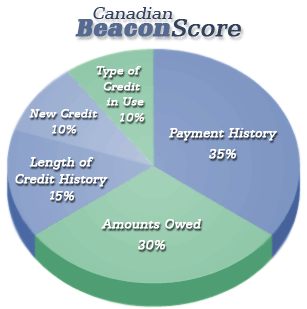The FICO/Beacon Score
How Lenders Determine Your Mortgage Approval
You may have heard of a FICO score before, but don’t know what it entails. When a lender reviews a mortgage application to see if a borrower qualifies for financing, their decision is largely based on a borrower’s credit history. Other factors used to qualify a mortgage include the applicant’s income, down payment, and the value and security of the property being purchased.
In order for a lender to assess an individual’s credit history, they must request it from a credit bureau. Credit bureaus (also known as credit reporting agencies, consumer reporting agencies, or credit reference agencies) such as Equifax or Transunion collect information from a number of different sources which they then use to compile a credit report and if requested, a credit score.
This score, which ranges from 300 to 900, is set by the credit bureau and is deduced by analyzing an individual’s past performance in dealing with credit in order to predict their future credit performance. Points are deducted or awarded based on specific criteria, such as payment history on other credit products, and the current limits and balances on other credit products. Individuals with a lower score require a more thorough review than those with higher scores, and many lenders may only consider applicants if their score is above a certain threshold, often 600 or more.
The FICO Score
FICO is an acronym for Fair Isaac & Company, the most well-known credit scoring system. The credit bureau uses this system to weigh a complete credit history and assign it a score, which is then used to estimate creditworthiness.

The FICO model, also referred to as the Beacon Score takes into consideration five main factors:
- Past payment history (35% of the score)
- Credit use (30% of the score)
- Length of credit history (15% of the score)
- Number of credit inquires (10% of the score)
- Types of credit used (10% of the score)
Payment history weighs heavily as to how you are perceived as a potential borrower. It is extremely important that you have no current late payments. These are more detrimental to a loan application than a record of an old bankruptcy case if perfect credit has been maintained since the bankruptcy. Keep in mind that paying off credit cards with recent late payments will not fix your credit history. Only time, and making your payments when due, can erase the negative effect of late payments.
It is important to emphasize that you can use credit responsibly. The longer you have had a credit account open, the better you will score. Maintaining low balances across several credit cards is better viewed than having fewer cards with higher maximized balances, but maintaining too many credit cards can negatively affect your FICO score. Also, note that closing several accounts can actually harm your credit profile.
The type of credit that you use will also have an impact. Credit received through a bank or department store is viewed better than high-interest credit attained through a finance company. Multiple inquiries can be a risk to borrowers if several cards are applied for, or other accounts carry the maximum allowable balance.
Factors that Affect FICO Scores
- Tax liens
- Bankruptcies
- Delinquent payments
- No recent credit card balances
- Numerous recent credit inquires
- Legal judgements against the borrower
- Too many or too few revolving accounts
- Limited credit history (too short in length)
- Balances on credit that are near the maximum
- Numerous new accounts opened within a 12 month period
- Too many mortgage lenders running your credit reports
- Making any major purchases while looking to buy a property (e.g. vehicle purchases)
How You Can Improve Your Credit Rating
Making a change to your FICO score means changing problematic items on your credit history. You need written confirmation from the creditor in order to change how that item gets reported.
Ensure you have your credit history reviewed by a professional loan officer before you start looking for a property to purchase. The loan officer can ensure that your loan is based on your most accurate and up-to-date credit information.
FICO scores are just guidelines, and don’t mean that you won’t get approved with a low FICO score. There are other factors that can affect underwriting decisions based on creditworthiness. Some factors include:
- A larger down payment
- Low debt-to-income ratios
- Excellent money saving history
- Reasonable explanations for negative items on a credit history
A Strong FICO Score Help Get the Best Interest Rate
As a potential homebuyer, it is important to remember that credit scores are also very important in securing the best interest rate on your mortgage product. Some lenders have a base loan price but will reduce the points on the loan if the credit score is above a certain level, while Other lenders may decide to add points or costs onto the base price if your credit score is below their preferred score. It is always in your best interest to protect and check your credit rating before you apply for a mortgage.